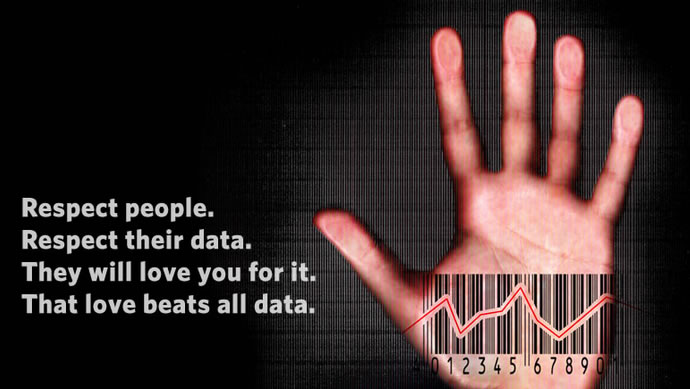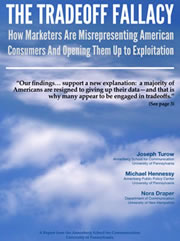Consumers don’t mind sharing their personal data with marketers and businesses in exchange for benefits. The nature and amount of data shared depends on the perceived value of the benefit.
It’s the principle of good old ‘quid pro quo’ and even goes back to permission marketing: “I, the consumer trust you and give you permission to engage with me under the conditions stipulated in our contract”.
That ‘quid pro quo’ shows in multiple areas and is often used in research. “Consumers don’t mind advertising or sponsored content a.k.a. native advertising in exchange for free access to news”. Or “consumers share their data because they want better tailored offers”.

The quid pro quo of data-driven and marketing optimization: the promise
The latter, for instance in the shape of recommendations, is what constitutes a big part of the revenues of companies such as Amazon (over 30%). It also is key in data-driven marketing: relevance in exchange of data and relevance THANKS to data. Data is now gathered in so many ways that for consumers it’s not really transparent which sources are used to ‘improve relevance’.
We need to care (more) about data because we care about people. People of flesh and blood, with amazing dreams, thoughts and emotions and zero bits and bytes. Respect them. Respect their data. They will love you for it. And that love? It beats all data.
The ‘quid pro quo’ equally is a continuous focus to enhance the customer experience across touchpoints whereby we strive to find the right match between the ‘quid’ and the ‘pro’ (which are not always in balance and to stand out often don’t even have too – excellence and positive surprises do matter).
Finally, the ‘quid pro quo’ is also the ‘supposed and silent’ foundation of marketing optimization.” I, the consumer, have seen your promise, and I decide to engage with you, offering my data, because I trust you deliver upon that promise”.
If one piece in that equation is missing, conversion drops, frustration sets in and consumer trust continues to erode. An example we all know: the promise of an ‘amazing white paper’ with far too many fields to fill in when progressive profiling is absent, and then seeing that the white paper is, well, far from amazing.
A large pool of consumers feel resigned to the inevitability of surveillance and the power of marketers to harvest their data – Annenberg School for Communication
Understanding why people share data: the tradeoff fallacy
There is certainly a lot of truth in that ‘quid pro quo’. Yes, people dig recommendations when properly used (remember Amazon), they do like nice rebates and they don’t mind getting benefits in exchange for some data.
However, there is a danger: you need to be careful and make sure you don’t misunderstand the reason behind the why people share data.
A rather big wakeup call in that sense was given in a report from the Annenberg School for Communication, University of Pennsylvania last Summer. The title of the report: “The Tradeoff Fallacy: How Marketers Are Misrepresenting American Consumers and Opening Them Up to Exploitation“.
In a nutshell, the researchers found that, as opposed to the claim that the majority of consumers (in this case Americans) consent to give out information about themselves as a trade-off for benefits, most de facto don’t believe that ‘data for discounts’ is a square deal.
Then why do they do it? On top of the fact that in some occasions they just want to, there is a big issue. Quoting from the report: a large pool of Americans feel resigned to the inevitability of surveillance and the power of marketers to harvest their data. Inevitability and power don’t exactly feel like a token of permission, belief in the quid pro quo and trust, well on the contrary.
The report doesn’t say that consumers don’t want to share data at all. It doesn’t state they don’t like personalization in whatever form or shape. What it does say is that there is this mind set and perception amongst consumers that doesn’t fit with several of the widely held beliefs regarding the ‘quid pro quo’, the trade-off.
People who know more about the ways marketers can use their information are more likely rather than less likely to accept discounts in exchange for data. — Annenberg School for Communication
The paradox of the empowered consumer: controlling the data
In other words: we have this paradox whereby we talk about ‘the empowered consumer’ who ‘increasingly is in control’, yet where consumers at the same time feel they aren’t in control at all, especially regarding their private information and data. They even haven ‘given up’ in a sense.
It’s important to recognize and understand this and the research is an absolute must-read:
- Because data-driven marketing and in general data-powered business is a core element of the present and future and the perceptions of consumers regarding data need to be taken into account.
- Because data, creativity and innovation go hand in hand.
- Because data and information is the lifeblood of integrated marketing and of digital business whereby developing better data capabilities is one of the business competencies to enhance in this age of digital transformation.
- And, at least as important, because the efficiency of the growing use of data for multiple purposes today requires transparency – as people do value it.
The data deluge is not just a challenge for many business but also for consumers.
The researchers say that, in contrast to other academics’ claims, Americans’ willingness to provide personal information to marketers cannot be explained by the public’s poor knowledge of the ins and outs of digital commerce. They aren’t stupid and they do realize lots of data is collected in ways they don’t know.
Insecurity, uncertainty, distrust: as we’ve seen so often in the past sooner or later they backfire.
Transparency and consumer trust: the ‘quid pro quo’ perception gap
There is a gap: a gap between what many marketers think and some want policy makers to believe regarding the trade-off and the consumer reality. Misrepresenting the perceptions of consumers regarding data control, transparency, security, privacy and so on is a ‘no go’. In a way it’s also a trust gap, or at least contributing to one.
For today’s data-driven marketers it’s not in their benefit to ignore these issues. Well on the contrary. Transparency and control lead to trust and trust leads to business.
The same Annenberg School research, for instance, also found that people who know more about the ways marketers can use their information are more likely rather than less likely to accept discounts in exchange for data when presented with a real-life scenario.
Giving back control: data belongs to the consumer
We live in times where the use of technologies in the realm of Big Data (analytics), social data, the connection of data pipelines, digitization, the Internet of Things and new ways of tracking consumer behavior, for instance in retail stores, add ever more – unstructured data – to this digital universe.
It is estimated that ninety percent of the world’s data has been produced in the last two years and 2.5 quintillion bytes of – mainly unstructured data – are produced every day.
At the same time we also live in times where trust is a huge issue and where concerns regarding data security get seen and felt by consumers across the globe.

Knowing that there is a big difference in perceptions regarding data between the US and many other regions where privacy is a sensitive issue with policy makers watching, all these factors contribute to the increasing need of being open and offering control to the consumer. Just like we did when we offered them total control over their data and preferences when permission became the norm in – good – email marketing.
Brands who treat data and privacy as an asset that belongs to the consumer in all possible ways, have the opportunity to stand out and avoid backfiring scenarios when consumers get fed up with the current trade-off fallacy.
In fact consumers already are: just look at how many fake addresses you get in your lists when you offer a white paper, certainly when you ask too much for far too little, which brings us back to the quid pro quo.
Far-reaching regulations: time to get your data act together
Research also clearly shows that the distrust regarding data usage is growing. So it’s time to act, not in the least because of the regulatory changes that will soon force everyone to make sure personal data gets the attention it deserves.
Just think about the very far-reaching consequences of the EU’s General Data Protection Regulation (GDPR) which has been formally approved and, even if it doesn’t become reality tomorrow, it will take far more time and effort to get prepared. Unfortunately a large majority of businesses isn’t aware of that. So more on the GDPR and the research which indicates growing data usage distrust in next entries.

